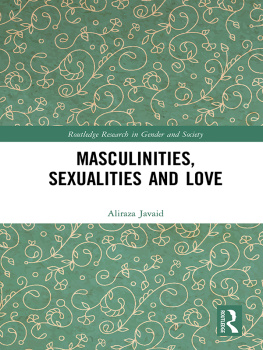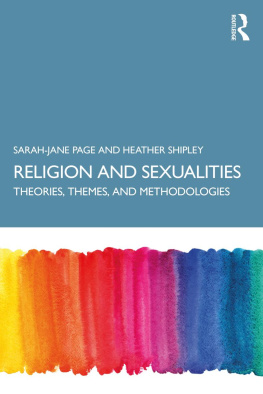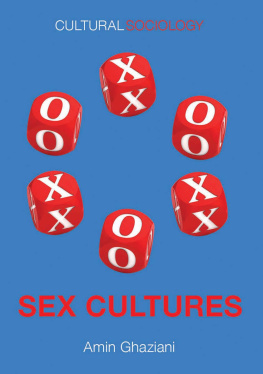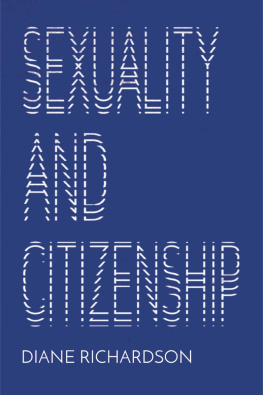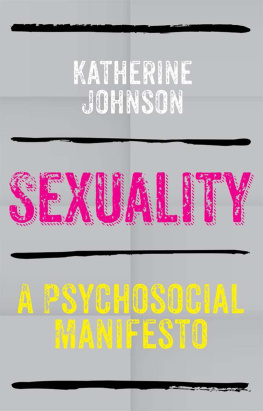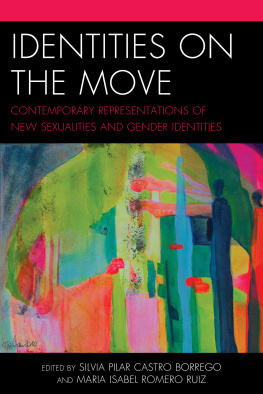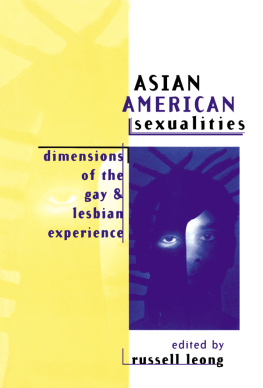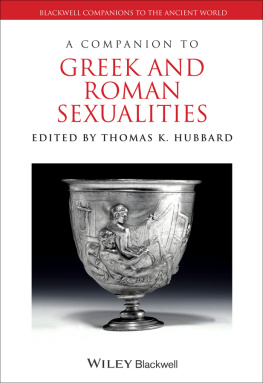Studying Sexualities
Studying Sexualities
Theories, Representations, Cultures
Niall Richardson
Sussex University
Clarissa Smith
Sunderland University
Angela Werndly
Sunderland University
Niall Richardson, Clarissa Smith, Angela Werndly 2013
All rights reserved. No reproduction, copy or transmission of this publication may be made without written permission.
No portion of this publication may be reproduced, copied or transmitted save with written permission or in accordance with the provisions of the Copyright, Designs and Patents Act 1988, or under the terms of any licence permitting limited copying issued by the Copyright Licensing Agency, Saffron House, 610 Kirby Street, London EC1N 8TS.
Any person who does any unauthorized act in relation to this publication may be liable to criminal prosecution and civil claims for damages.
The authors have asserted their rights to be identified as the authors of this work in accordance with the Copyright, Designs and Patents Act 1988.
First published 2013 by
PALGRAVE MACMILLAN
Palgrave Macmillan in the UK is an imprint of Macmillan Publishers Limited, registered in England, company number 785998, of Houndmills, Basingstoke, Hampshire RG21 6XS.
Palgrave Macmillan in the US is a division of St Martins Press LLC, 175 Fifth Avenue, New York, NY 10010.
Palgrave Macmillan is the global academic imprint of the above companies and has companies and representatives throughout the world.
Palgrave and Macmillan are registered trademarks in the United States, the United Kingdom, Europe and other countries.
ISBN: 978-0-230-22042-3 hardback
ISBN: 978-0-230-22043-0 paperback
This book is printed on paper suitable for recycling and made from fully managed and sustained forest sources. Logging, pulping and manufacturing processes are expected to conform to the environmental regulations of the country of origin.
A catalogue record for this book is available from the British Library.
A catalog record for this book is available from the Library of Congress.
10 9 8 7 6 5 4 3 2 1
22 21 20 19 18 17 16 15 14 13
Printed in China
Contents
4 Representations of Homosexuality
Case Study: Will and Grace
5 Representations of Lesbians on Television
Case Study: The L Word
6 Representations of Heterosexuality 1
Case Study: Sex and the City
7 Representations of Heterosexuality 2
Case Study: Entourage
8 Representations of Teenage Sexuality
Case Study: Point Horror and Twilight
Introduction
Many commentators are agreed that Western culture is obsessed by sex, and that the media television, cinema, magazines, music, books and the internet are saturated with sexual content. Its hard not to agree when you hear Rihanna extolling the virtues of whips and chains, and see advertising which suggests that a particular brand of shampoo can induce multiple orgasms in a woman completing her morning ablutions. The old adage sex sells has never seemed more appropriate. Yet there is something fundamentally worrying in the assertion that sex is everywhere, and always persuasive. Theres a sense of something underhand being perpetrated by representations of sex, an implication that sex can only appeal to our baser natures, and a suggestion that sex is, at best, trivial and superficial. For some, wed all be better off if sex werent mentioned or referenced so frequently in popular culture. Yet, it is precisely this idea that sex is an entirely private matter that renders sex and sexuality so important to studies of contemporary culture and society.
Why should sex be so important? Well, read this comment from the Daily Mails self-styled right-wing columnist Richard Littlejohn.
Take the latest episode of Torchwood, the Doctor Who spin-off. It began with a seven-minute gay sex scene, which outraged many viewers. Why? The BBC says: We aim to depict relationships, whether heterosexual or homosexual, in an honest and realistic way. Fair enough. But what on earth has sex got to do with a science fiction show? Why does the lead character have to be a pansexual? Theyll be telling us next that the Daleks all wore bondage gear under their tinfoil armour.
But this is what you get when you hire a proselytising homosexual like Russell T. Davies to write mainstream drama. Gifted writer he may be, but he comes with an agenda.
There is a place for exploring gay themes on TV, but not at prime time on BBC1 in a programme watched by many children and their parents.
(Littlejohn, 2011)
Look at the ways in which Littlejohn expresses himself: defining primetime BBC1 as not the place for gay themes and their exploration and not the place for pansexual heroes. Prime time is family time, family time is not a place for homosexuality or sex, nor is science fiction Littlejohn clearly doesnt know his science fiction very well: sex has been a key component of SciFi television, opening up visions of future sex in, for example, Star Trek (NBC: 196669), Farscape (Nine Network: 19992003), The Outer Limits (Showtime: 19952002) and Stargate Atlantis (Sci-Fi Channel: 200409) (Garber and Paleo, 1990), themes which fans have eagerly taken up and worked into explicitly sexual slash fictions (see Bacon-Smith, 1992; Jenkins, 1992). Yet here pansexuality supposedly contributes nothing to the characterizations of the protagonists. According to Littlejohn, to include any reference to homosexuality is to be proselytising that is, attempting to persuade or convert others to your point of view. Torchwood didnt just have a gay sex scene, it had a seven-minute gay sex scene, which outraged many viewers. Littlejohn suggests that there is simply no need for showing or mentioning gay sex in a primetime series watched by children and adults, and that therefore Russell T. Davis is doing more than providing entertainment hes preaching homosexuality to that prime-time audience. Sex is apparently unnecessary for a drama like Torchwood. But would Littlejohn express the same irritations if Captain Jack only flirted with, and seduced, young female sidekicks like his friend Dr Who at an earlier time with an even larger audience of child viewers? What we could take to be a reasonable objection to gratuitous sex on TV or in film could, on further inspection, turn out to be a political rejection of any expression of sexual interests, possibilities or imaginings that do not fit with a very narrow sense of proper sexuality. The demand to keep your private life private can often be a demand to keep quiet about sexual interests and identities that dont fit with natural heterosexuality.
How this book works
Given the medias increasing fascination with sexuality it is hardly surprising that university courses in media, film and cultural studies are now introducing students to debates in sexuality studies. While discussions about sexuality had previously been tagged on at the end of a feminism or gender and representation module, university courses have now devised full modules, at both undergraduate and postgraduate level, to introduce students to the critical study of sexuality. The problem, however, is that much critical writing in the area, especially the work often labelled queer theory, is written in dense academic jargon which can be off-putting to the new student. This book is intended to address this problem.


